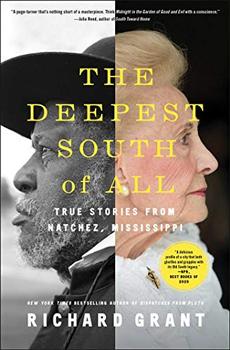Summary | Excerpt | Reviews | Beyond the Book | Readalikes | Genres & Themes | Author Bio

Critics' Opinion:
Readers' Opinion:
First Published:
Sep 2020, 288 pages
Paperback:
Aug 2021, 288 pages
 Book Reviewed by:
Book Reviewed by:
Jane McCormack
Buy This Book
She led me up a steep, narrow staircase to the room where I would sign and sell books. I set out my wares and greeted my customers. They were far more sophisticated than I was expecting in a small, isolated Mississippi town. I talked with an extremely well-read woman who had lived all over the world before coming back to Natchez, where she grew up. The way of life here, she had decided, suited her best.
Asked to describe it, she said, "We're house-crazy. We adore old homes, antiques, throwing parties, making it fabulous. Gay men love it here. Natchez is very liberal and tolerant in some ways, and very conservative and racist in other ways, although I will say that our racists aren't generally hateful or mean. Nor do they think they're racists. There's still a lot of denial in the white community about the fact that this whole town was built on slavery. Most black people don't like thinking about slavery either, although they're acutely aware of it."
She talked about the insularity of the town, and the singularity of its culture. "We look more to New Orleans than the rest of Mississippi. The Catholic influence is strong in both the black and white communities. We're obsessed with our history, but it's often a self-serving mythological version of that history. Genealogy is big. And there's a whole spectrum of behavior that we refer to politely as 'eccentricity.'?"
I wondered aloud if Natchez might be an interesting place to write about. She made me swear to keep her out of it and warned me against bird-watching: "A lot of outsiders come down here like bird-watchers, studying the inhabitants, observing their quirks and colorful plumage. Well, guess what: the birds are looking right back at you. And sooner or later, one of them is going to talk ugly about you."
Gay couples wandered through and were greeted warmly and casually. Regina brought me a platter of slow-cooked, peppery brisket with horseradish on wood-fired flatbread, and a glass of good Spanish wine to wash it down. My antennae were swiveling. Natchez didn't remind me of anywhere else. I liked it here, yet I felt a creeping sense of unease. King's Tavern is allegedly haunted by the ghosts of murdered women and children, but that wasn't it. Slave coffles were still marching through my brain. Greasy rags were polishing dark skin. The past had split open like a badly stitched wound and was leaking into the present.
"Do you have a suit and tie?" Regina asked, as I packed up my unsold books. "There's a party tonight at Stanton Hall. I think you'll find it interesting."
"You should have warned me." I said, standing there in dark jeans and boots. "I do have a sports coat."
"That'll be fine," she said. "You have a British accent." We drove to Doug and Regina's house as darkness fell on the town. I caught glimpses of a church spire, graceful old houses that could have been in New Orleans, a 1950s malt shop that still had its white and colored takeout windows, although they were no longer observed. Then we pulled in through trees and old brick walls and parked behind an 1852 Greek Revival home. This was Twin Oaks, and my room was in a long, low wooden building across the walled garden, now functioning as a stylish and comfortable bed-and-breakfast for tourists.
I put on my sports coat and walked up to the big house. An owl hooted, fountains trickled in the darkness. I climbed some steep stone steps and opened the door into the kitchen. There were three big refrigerators, a six-burner restaurant stove, ice-cream makers, bread machines. Regina poured some wine and led me through to the next room, which had comfortable modern sofas and a television. She pointed to a painting of a skinny white man with spiky hair and a guitar. "I like to say we're the only antebellum home in Natchez with a self-portrait of Ronnie Wood," she said, referring to the Rolling Stones guitarist, who had given her the painting. "He has his issues, of course, but he's really a sweet man."
Excerpted from The Deepest South of All by Richard Grant. Copyright © 2020 by Richard Grant. Excerpted by permission of Simon & Schuster. All rights reserved. No part of this excerpt may be reproduced or reprinted without permission in writing from the publisher.




Children are not the people of tomorrow, but people today.
Click Here to find out who said this, as well as discovering other famous literary quotes!
Your guide toexceptional books
BookBrowse seeks out and recommends the best in contemporary fiction and nonfiction—books that not only engage and entertain but also deepen our understanding of ourselves and the world around us.